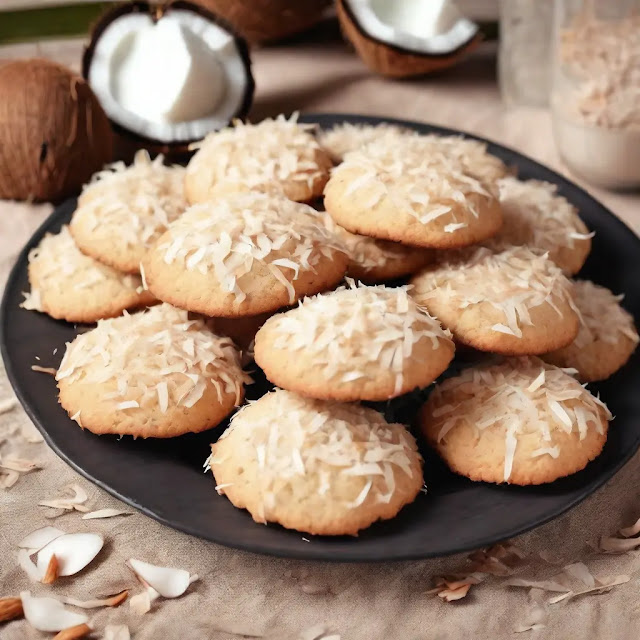Coconut cookies are a delightful and irresistible treat that combines the rich and tropical flavor of coconut with the buttery goodness of cookies. These delectable treats have gained popularity among both coconut lovers and cookie enthusiasts. In this article, we will explore the unique features and key benefits of coconut cookies, enriched with SEO keywords.
1. Rich in Coconut Flavor:
Coconut cookies are known for their distinct and intense coconut flavor. The cookies are often made with shredded or desiccated coconut, which adds a delightful texture and a tropical taste to each bite. The natural sweetness of coconut enhances the overall flavor profile of these cookies, making them a favorite among coconut enthusiasts.
2. Crunchy Texture:
One of the key features of coconut cookies is their satisfyingly crunchy texture. The addition of coconut flakes or shredded coconut gives the cookies a delightful crunch that contrasts beautifully with the softness of the cookie dough. This unique texture adds an enjoyable element to every bite.
3. Versatility in Recipes:
Coconut cookies can be made in various forms and variations. From simple coconut shortbread cookies to more elaborate creations like coconut macaroons or coconut chocolate chip cookies, there are endless possibilities to explore. This versatility allows for customization and the opportunity to experiment with different flavors and textures.
4. Health Benefits of Coconut:
Coconut is not only delicious but also offers several health benefits. It is a good source of healthy fats, dietary fiber, and essential nutrients. Coconut contains medium-chain triglycerides (MCTs), which are easily digestible and can provide a quick source of energy. Additionally, coconut is rich in antioxidants and may have antimicrobial properties.
5. Vegan and Gluten-Free Options:
Coconut cookies can easily be adapted to accommodate various dietary preferences. By using plant-based ingredients and gluten-free flours, you can create vegan and gluten-free coconut cookies that everyone can enjoy. These options make coconut cookies inclusive and accessible to a wider range of individuals.
Coconut Cookie Recipe:
Ingredients:
- 1 cup shredded coconut
- 1 cup all-purpose flour (or gluten-free flour for a gluten-free version)
- 1/2 cup unsalted butter (or vegan butter for a vegan version), softened
- 1/2 cup granulated sugar
- 1/4 teaspoon salt
- 1/2 teaspoon vanilla extract
Instructions:
1. Preheat the oven to 350°F (175°C) and line a baking sheet with parchment paper.
2. In a mixing bowl, cream together the softened butter and sugar until light and fluffy.
3. Add the vanilla extract and salt, and mix well.
4. Gradually add the flour and shredded coconut to the mixture, and mix until well combined.
5. Roll the dough into small balls and place them on the prepared baking sheet, leaving space between each cookie.
6. Gently press down on each cookie ball with the back of a fork to create a crisscross pattern.
7. Bake in the preheated oven for 12-15 minutes, or until the edges of the cookies turn golden brown.
8. Remove from the oven and let the cookies cool on the baking sheet for a few minutes before transferring them to a wire rack to cool completely.
FAQs Coconut Cookies:
1. Are coconut cookies suitable for individuals with nut allergies?
- Yes, coconut is not considered a nut, and coconut cookies can be a suitable option for individuals with nut allergies. However, it's important to check the specific dietary needs of the individual and ensure that the cookies are prepared in a nut-free environment.
2. Can I use coconut flour instead of shredded coconut in the recipe?
- While coconut flour can be used in baking, it has a different texture and absorbs more liquid than shredded coconut. If you choose to use coconut flour, you may need to adjust the recipe and add additional moisture or binding agents to achieve the desired consistency.
3. How should I store coconut cookies?
- To keep coconut cookies fresh, store them in an airtight container at room temperature. They can typically remain fresh for up to a week. If you live in a humid climate, you may want to store them in the refrigerator to maintain their texture and prevent them from becoming too soft.
4. What is the nutritional value of coconut cookies?
- The nutritional value of coconut cookies can vary depending on the specific recipe and ingredients used. Generally, coconut cookies tend to be higher in calories, fat, and sugar compared to other types of cookies. They usually contain coconut, which provides dietary fiber, healthy fats, and some essential nutrients. However, they may also contain added sugars, refined flours, and other ingredients that contribute to their taste and texture. It's important to read the nutrition label or refer to a specific recipe to get accurate information about the nutritional value.
5. Are coconut cookies gluten-free?
- Coconut cookies can be gluten-free if they are made with gluten-free ingredients such as gluten-free flours (e.g., almond flour, rice flour, or coconut flour) and certified gluten-free oats. However, it's essential to check the packaging or ingredient list of store-bought coconut cookies or refer to a specific recipe to ensure they are gluten-free. Some commercially packaged cookies or homemade recipes may contain gluten-containing ingredients like wheat flour or barley malt.
6. Are coconut cookies suitable for a vegan diet?
- Coconut cookies can be made vegan-friendly by using plant-based ingredients and avoiding animal-derived products such as eggs and dairy. Vegan coconut cookies typically use alternatives like vegan butter or coconut oil instead of dairy butter, and flaxseed meal or applesauce as egg substitutes. However, it's important to check the ingredient list or refer to a specific recipe to ensure that no animal products are used. Commercially packaged coconut cookies may vary, so it's best to look for products labeled as vegan or check the ingredient list for any animal-derived ingredients.

.webp)
Comments
Post a Comment